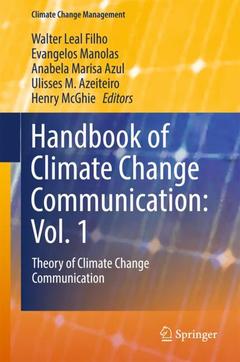Handbook of Climate Change Communication: Vol. 1, 1st ed. 2018 Theory of Climate Change Communication Climate Change Management Series
Coordonnateurs : Leal Filho Walter, Manolas Evangelos, Azul Anabela Marisa, Azeiteiro Ulisses M., McGhie Henry

This comprehensive handbook provides a unique overview of the theory, methodologies and best practices in climate change communication from around the world. It fosters the exchange of information, ideas and experience gained in the execution of successful projects and initiatives, and discusses novel methodological approaches aimed at promoting a better understanding of climate change adaptation. Addressing a gap in the literature on climate change communication and pursuing an integrated approach, the handbook documents and disseminates the wealth of experience currently available in this field.
Volume 1 of the handbook provides a unique description of the theoretical basis and of some of the key facts and phenomena which help in achieving a better understanding of the basis of climate change communication, providing an essential basis for successful initiatives in this complex field.
Describes research and innovation on climate change communication in a comprehensive way
Presents cases and material from over 40 countries
Provides government and non-government bodies with a sound basis to promote climate change adaptation efforts
The most comprehensive publication on the topic so far
Includes supplementary material: sn.pub/extras
Date de parution : 02-2018
Ouvrage de 397 p.
15.5x23.5 cm
Date de parution : 06-2019
Ouvrage de 397 p.
15.5x23.5 cm



